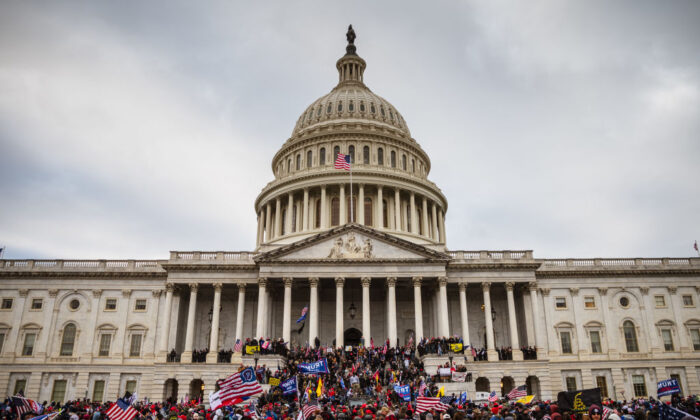President-elect Donald Trump and Vice President-elect JD Vance have offered various statements on the prospect of pardoning Jan. 6 defendants.
President-Elect Donald Trump is set to be inaugurated on Jan. 20 and, with that, gain all the powers of the presidency as outlined by the U.S. Constitution.
The pardon power, in particular, has provoked considerable debate in recent months as Trump will be entering office amid a wave of prosecutions in response to the events of Jan. 6, 2021.
Many defendants have indicated an interest in pardons and have attempted to halt court proceedings over the prospect after Trump’s electoral win.
At least two of the defendants, Luke Coffee and AJ Fischer, have penned open letters asking Trump for pardons.
A jury found Coffee guilty on multiple counts, including assaulting, resisting, or impeding certain officers using a weapon. During an interview with The Epoch Times, he maintained the verdicts were wrong and criticized how the cases unfolded.
“All these trials and convictions have been fruit from a poisonous tree,” Coffee said.
On the fourth anniversary of the “Stop the Steal” rally and subsequent protest at the U.S. Capitol, Attorney General Merrick Garland touted his department’s prosecutions.
“The public servants of the Justice Department have sought to hold accountable those criminally responsible for the January 6 attack on our democracy with unrelenting integrity,” he said.
“They have conducted themselves in a manner that adheres to the rule of law and honors our obligation to protect the civil rights and civil liberties of everyone in this country.”
According to the Department of Justice (DOJ), more than 1,500 people have been charged and approximately 1,009 have pleaded guilty to charges related to the events of Jan. 6, 2021.
Garland’s presumptive successor, former Attorney General Pam Bondi, was more skeptical about the cases during her confirmation hearing on Jan. 15. During her hearing, she accused the DOJ of weaponization on multiple fronts and indicated she would take a careful approach of looking at the prosecutions on a case-by-case basis when advising on pardons.
Trump has indicated that he will pardon at least some of the convicted and given his comments about the prosecutions, it’s likely some of the remaining will fall away when he enters office.
In December, Time magazine asked Trump whether he would pardon all defendants. “I’m going to do case-by-case, and if they were non-violent, I think they’ve been greatly punished,” he said. “And the answer is I will be doing that, yeah, I’m going to look if there’s some that really were out of control.”
He added that a “vast majority should not be in jail, and they’ve suffered gravely.”
Vice President-elect JD Vance, meanwhile, has said that violent Jan. 6 defendants should not receive pardons but also said there was “a little bit of grey area” and that “there were a lot of people … who were prosecuted unfairly.”
According to the U.S. Attorney’s Office for the District of Columbia, “approximately 608” individuals have been charged with “assaulting, resisting, or impeding law enforcement agents or officers or obstructing … officers during a civil disorder.”
Treniss Evans, who helped coordinate legal efforts for Jan. 6 defendants, told The Epoch Times that Vance “obviously is not educated on the topic.” Evans has proposed pardons for various categories of defendants.
Evans pleaded not guilty to various counts related to Jan. 6, including disorderly conduct and demonstrating in a Capitol Building. As part of a plea agreement in 2022, he pleaded guilty to entering and remaining in a restricted building or grounds.
Like Coffee, he criticized the DOJ and how the cases were handled by the courts. He also suggested getting a fair trial in Washington was difficult, if not impossible, for Jan. 6 defendants. He pointed to how Trump said he couldn’t get a fair trial in his election in Washington, where special counsel Jack Smith brought his election interference case.
The statute underlying that charge was the subject of an appeals court decision in the U.S. Court of Appeals for the D.C. Circuit. In a 2–1 decision, it said that the DOJ could apply the trespassing law without proving that the defendant was aware that former Vice President Mike Pence’s presence on the Capitol grounds was the reason for restricting that area. However, a dissent by Judge Gregory Katsas, who was appointed by Trump during his first term, said he would have vacated the conviction in question.
Another charge affecting multiple Jan. 6 defendants was one alleging obstruction in alleged violation of the Sarbanes Oxley financial reform law. The Supreme Court heard an appeal related to the charge and in June, held that the government had erred in its interpretation of the law.
After that case, known as Fischer v. United States, the DOJ said that every person charged under Section 1512 was also charged with something else and would continue to face criminal exposure even if that charge were dropped.
Of approximately 259 who were charged under that law, approximately 126 had their cases still pending in D.C. District Court when the Supreme Court issued its decision in Fischer, according to the DOJ on Jan. 6, 2025.
The DOJ decided to forgo the charge for approximately 119 of those defendants, and it didn’t oppose vacating or dismissing the charge in approximately 65 of the cases that were adjudicated by the time Fischer was decided.

